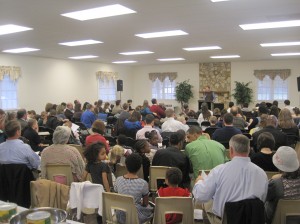Dear Sovereign Redeemer and other friends,
In my last post, titled “A Preacher’s Building Blocks,” I argued that every time a preacher undertakes the painstaking task of preparing a sound, expository sermon, that preacher gains a rich deposit for his use in the future, a “building block” so to speak. I closed that post by threatening to write about the methods I use to prepare and then deliver what I hope are sound, expository sermons. I now attempt to make good on that threat.
Two preliminary comments:
1. I know that I have many, many superiors in this category.
2. None of this is “secret sauce” which should be employed by everyone or which guarantees success.
Still, these are methods employed by one man (me) who has been doing this week in and week out for several years now, and I hope that many will find that this stimulates thought, whether or not the methods themselves are emulated.
These are the posts that will follow:
- The Anatomy of a Sermon – Bible Work
- The Anatomy of a Sermon – Study Bibles & Commentaries
- The Anatomy of a Sermon – Preparing to Write
- The Anatomy of a Sermon – Writing the Sermon
- The Anatomy of a Sermon – Thoughts on Preaching
Stay tuned.


